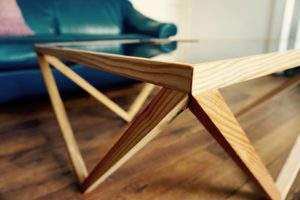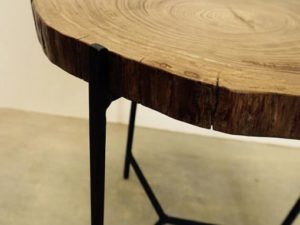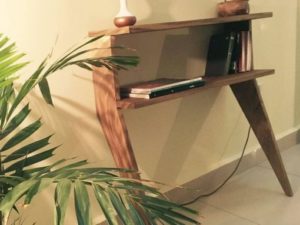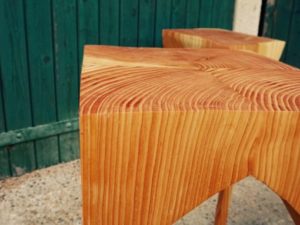Stylish Nonsense – Interview
17/07/2018
Swimming with kids around Bordeaux
24/07/2018The rise of handmade furniture – Interview with Goat Lab Furniture

In an age of consumerism and throw away culture, a new breed of small artisans are taking root to defend and promote quality handmade furniture that will last for generations. One such company based in the beautiful vineyard surrounded town of Bordeaux, is Goat Lab Furniture.
Owned and run by Mayuka, a Sri Lankan born, London raised Genetics graduate, who decided change his career and put his hand to designing and hand crafting made to measure furniture. We talked to him about his new world of wood and sawdust and why he thinks handmade is better than mass produced.
Why do you think there has been a growing interest in artisanal handmade furniture recently?
I think first and foremost, people are witnessing a natural world under threat from human activity like never before in history. We are now very aware that our actions and habits, the way we decide live our lives, has a direct impact on the future of our planet, no matter how small we may think those actions may be. I don’t think this was the case a few generations ago, and as one of the results of this new way of thinking I can see people beginning to reuse, refurbish old items and of course shun away from mass production for more personal, better quality items that can be enjoyed for generations.
How do you run a business in a sustainable way when your main raw material is wood?
When I first became interested in furniture making whilst spending some time living in south Asia, I always told myself that I do not want to be partly responsible for the deforestation of natural hardwood forests.
What kind of clients are most interested in handmade furniture?
Living in Bordeaux, I have clients from many walks of life and most people share their enthusiasm for local artisans. I have worked with locals and expats (my English helps), interior designers from around France and commercial clients.
When you buy a piece of furniture for your home or business, you want it to look great and be made in a high quality way, these are the fundamentals for when I am making my items. I would never sell a sub-standard piece of furniture because it is not a fair way of trading, and it would reflect badly on me and my company.
How did you end up going from such a scientific background to something so completely different?
I’m not completely sure of all the details myself!
Looking back now to my school days, I always remember enjoying the creative and building aspects of my time there. Having being lucky enough to attend an excellent school that provided lessons in product design, electronics, making items using CAD, as well as wood working techniques; I felt a growing desire to change the course of my professional life and get back to what I loved most designing and making things.
My wife and I decided to live in Asia for a few years, do some travelling and experience some of the different flavours of life on the other side of the world. I started an internship in Sri Lanka for a furniture company, after which I started my own company: Goat Lab Furniture. I found there is a renewed interest in quality handmade furniture in Sri Lanka too.
How would customers find made to measure furniture makers in the internet age?
I think in the pre-internet age, consumers trends tended to emanate from film, TV, the press and magazines, today you can do a quick hashtag search on most social media platforms – Instagram and Pinterest are the first that come to mind for interior design and furniture. It is sometimes difficult for smaller creators such as myself to land on the first page of google because larger corporations are big spenders for marketing online,, especially on Google AdWords.
Although it may take a little longer, I would highly recommend doing a little digging for a local artisan, look out for flyers at your local boulangerie, do a google map search for an ‘ebeniste’ or ‘meuble sur mesure’, check out the local markets or ask your friends and family for recommendations. There are also local incubators where artisans work together, for example the pépinière d’entreprise at the Hauts de Garonne Développement.
Contact details for your local, friendly furniture maker:
Tel: 0629275643









